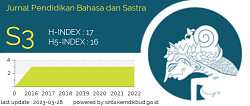NATIVE VERSUS NON-NATIVE ENGLISH SPEAKING TEACHERS: AN INSIGHT INTO INDONESIAN STUDENTS’ VOICES
Abstract
Several issues exist in determining the best English teacher for EFL students. Both native and non-native speaker teachers can succeed as English teachers. But there are always some pros and cons for both sides. This present paper intends to investigate the perspective or perception of college students towards their native English speaking teachers (NESTs) and non-native English speaking teachers (Non-NESTs) in teaching EFL. This research is a quantitative study with survey design. In gaining the data, twenty-five respondents of the 4th grade undergraduate students of the English Department in Cimahi were asked to respond the itemized statements on the questionnaire which used Likert-scales. The questionnaire itself was adopted and developed from the previous researcher with the similar problem background which was conducted in 2011. This study revealed that students have positive perceptions toward NEST and Non-NEST, although, in some circumstances, the students face several problems in the learning process. Thus, for both NEST and Non-NEST are required to handle the problems encountered by the students.
Keywords
Full Text:
PDFReferences
Alseweed, A.M. (2012). University Students’ Perceptions of the Influence of Native and Non-native Teachers. English Language Teaching; Vol. 5, No. 12.
Anderson, L. (1989). The Effective
Teacher: Study Guide and Reading. USA:McGraw-Hill, Inc.
Brady, B. (2010). Non-native English Speaking Teacher (Non-native English Speaking Teacher).Caucus Annual Review. The WatesolNnest, Vol 1.
Braine, G. (2010). Nonnative Speaker English Teachers: Research, Pedagogy, and Professional Growth. New York, NY: Taylor & Francis
British Council. (2013). Languages for the Future. Available at: https://www.britishcouncil.org/sites/default/files/languages-for-the-future-report.pdf. Accessed on 14th of November 2015.
Brown, E. (2013). Native and Non-native English Speaking ESL/EFL Teachers in Sweden: A Study on Students’ Attitudes and Perceptions towards the Teaching Behavior of Native and Non-native English Speaking Teachers. AkademinForUbildningOchEkonomi.
Business Dictionary. (2015). Available at: http://www.businessdictionary.com/definition/perception.htmlgeneral. Accessed on 14th of November 2015.
Canagarajah, A. S. (1999). Interrogating the "Native-Speaker Fallacy": Non-Linguistic Roots, Non-Pedagogical Results. In G. Braine (Ed.), Non-Native Educators inEnglish Language Teaching (pp. 77-92). Mahwah: Lawrence Erlbaum Associates.
Clark, E. &Paran, A. (2007). The Employability of Non-Native-Speaker Teachers of EFL. K@ta: A Biannual Publication on the Study of Language Literature.
Cortazzi, M., & Jin, L. (1996). Cultures of Learning: Language Classrooms in China. In H. Coleman (Ed.), Society and the Language Classroom. Cambridge: Cambridge University Press.
Coşkun, A. (2013). Native Speakers as Teachers in Turkey: Non-native Pre-service English Teachers’ Reactions to a Nation-wide Project. The Qualitative Report 2013 Volume 18. Turkey, Bolu:AbantIzzetBaysal University.
Harmer, Jeremy. (2007). The Practice of English Language Teaching. England, UK: Pearson Education Limited.
Lee, J. (2010) Non-native English‐Speaking Teachers’ Experiences And Their Pedagogy In The Esl Classroom. The WatesolNnest, Volume 1.
Llurda, E. (2005). Non-Native Language Teachers: Perceptions, Challenges, and Contributions to the profession. Springer Science+Business Media, Inc. New York, NY 10013 USA. Available at: https://books.google.co.id/books?hl=id&lr=&id=KMHeQH71AAoC&oi=fnd&pg=PP9&dq=adapted+questionnaire+on+students%27+perception+of+native+and+non-native+speaker+teacher&ots=6yqagKsmUS&sig=nw-jyh3qAKhKY9F6Y_8eeovtULs&redir_esc=y#v=onepage&q&f=false. Accessed on 14th of November 2015.
Mahboob, A. (2010). The NNEST Lens: Non-Native English Speakers in TESOL. Newcastle upon Tyne, UK: Cambridge Scholars Publishing. Available at: https://books.google.co.id/books?id=396mBgAAQBAJ&pg=PA112&dq=Status+of+non-native+English+speaking+teachers+in+the+United+States&hl=id&sa=X&ved=0CE8Q6AEwB2oVChMIm7i5v7-XyQIVjI6UCh2TPgqf#v=onepage&q=Status%20of%20non-native%20English%20speaking%20teachers%20in%20the%20United%20States&f=false. Accessed on 14th of November 2015.
Malik, R.S., &Hamied, F.A. (2014). Research Methods: A Guide for First Time Researchers. UPI Press
Maum, R. (2002). Nonnative-English-Speaking Teachers In The English Teaching Profession. Jcps Adult And Continuing Education Edo-Fl- Eric Digest.
Medgyes, P. (2006). When the Teacher is a Non-Native Speaker. In M. Celce-Murcia (Ed.), Teaching English as a Second or Foreign Language (pp. 429-442). Beijing: Foreign Language Teaching and Reseach Press.
Murtiana, R. (2011). Student’s Perceptions Of Native Speaker And Non-Native Speaker Teachers: Implication For Teacher Education. Paper presented at the 5th International Seminar: Teacher Education in the Era of World Englishes, SatyaWacana Christian University.
Rizky, D.D. (2013). Students’ Perspectives On Being Taught By Native English Speakers: A Case Study At A Private Local English Community. A Thesis of Universitas Jambi.
Stronge, James. (2007). Qualities of Effective Teachers. USA: ASCD Publications. Available from Net Library Database.
Tsou, S-Y. (2015). Taiwanese University Students’ Perceptions toward Native and Non-Native English-Speaking Teachers in EFL Contexts. Available at :(2013).http://ir.lib.kuas.edu.tw/bitstream/987654321/13094/2/Taiwanese_university_students_perceptions_toward_native_and_nonnative_Englishspeaking_teachers_in_EFL_contexts.pdf. Accessed on 14th of November 2015.
Wu, K-H. (2009). Haunting Native Speakerism? Students’ Perceptions toward Native Speaking English Teachers in Taiwan. Vol. 2, No. 3 English Language Teaching, Department of English. Aletheia University. Taiwan.
DOI: https://doi.org/10.17509/bs_jpbsp.v18i1.12145
Refbacks
- There are currently no refbacks.
Copyright (c) 2018 Jurnal Pendidikan Bahasa dan Sastra
p-ISSN 1412-0712 | e-ISSN 2527-8312
JPBS is published by:
Fakultas Pendidikan Bahasa dan Sastra (Faculty of Language and Literature Education), Universitas Pendidikan Indonesia,
in cooperation with
TEFLIN, and APPBIPA


